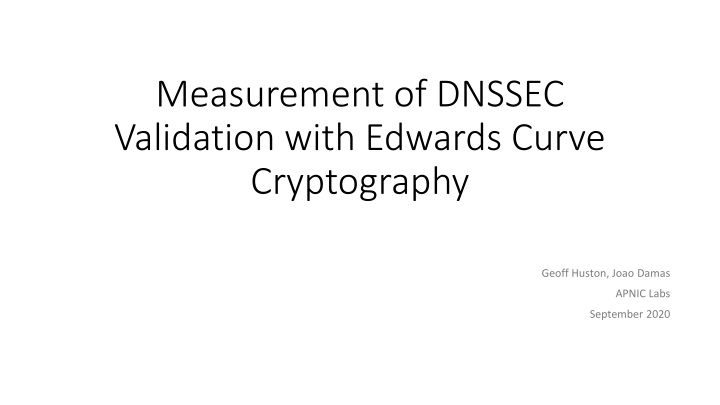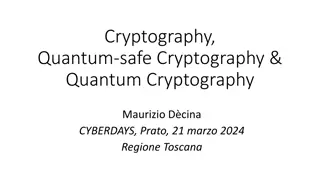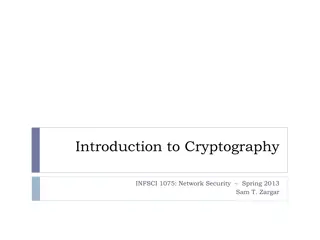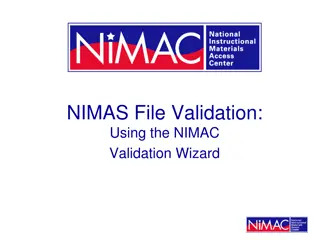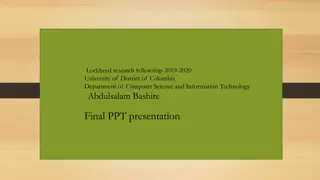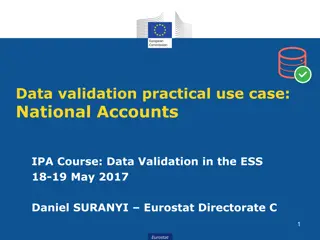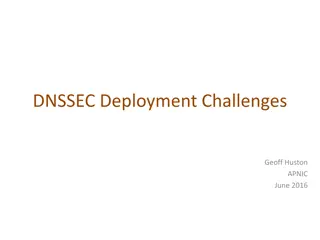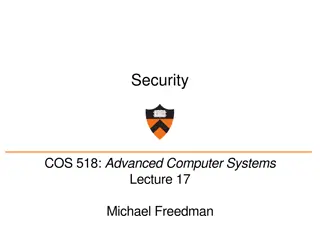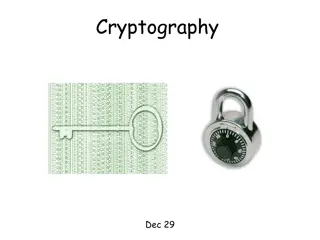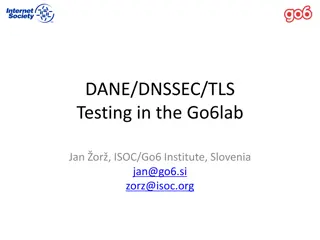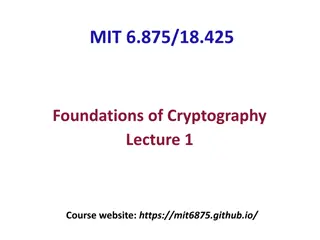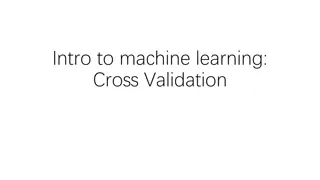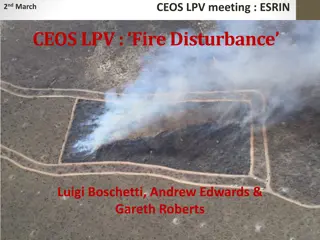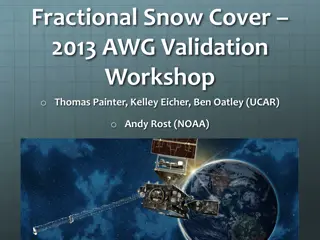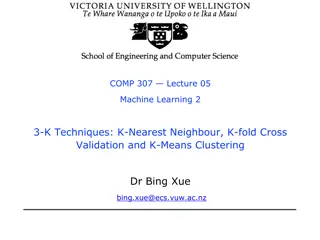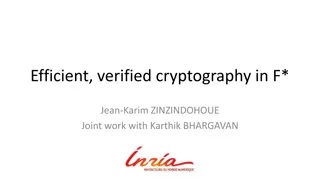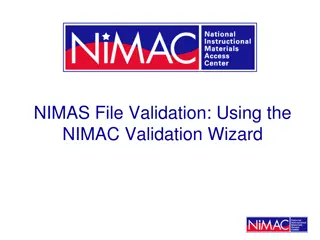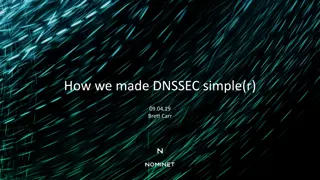Evaluation of Ed25519 Cryptography Performance in DNSSEC Validation
Edwards Curve Cryptography, specifically the Ed25519 algorithm, offers faster performance and high crypto density compared to other algorithms. This evaluation study compares key sizes, processing times, and validation support for Ed25519, ECDSA P-256, RSA-2048, and RSA-4096 in DNSSEC validation scenarios. Results show Ed25519's efficiency and effectiveness in digital signature generation and verification.
Download Presentation

Please find below an Image/Link to download the presentation.
The content on the website is provided AS IS for your information and personal use only. It may not be sold, licensed, or shared on other websites without obtaining consent from the author.If you encounter any issues during the download, it is possible that the publisher has removed the file from their server.
You are allowed to download the files provided on this website for personal or commercial use, subject to the condition that they are used lawfully. All files are the property of their respective owners.
The content on the website is provided AS IS for your information and personal use only. It may not be sold, licensed, or shared on other websites without obtaining consent from the author.
E N D
Presentation Transcript
Measurement of DNSSEC Validation with Edwards Curve Cryptography Geoff Huston, Joao Damas APNIC Labs September 2020
Edwards Curve Cryptography Relatively recent crypto offering, first published in 2011 One of the Elliptic-Curve family of algorithms, using a twisted Edwards Curve Intended to distinguish itself from other crypto algorithms by being: Faster Unencumbered by lingering IPR disputes High crypto density Public domain source code
Im really not a crypto geek So I ll do a REALLY BRIEF summary of Edwards Curves The normal form of elliptic curves that Harold Edwards studied in 2007 was: x2+ y2= c2+ c2x2y2 The twisted transform of such curves results from the relationship ax2+ y2= 1 + dx2y2 These curves can be used to derive a digital signature algorithm for use in public key cryptography, described in RFC 8032.
Im still not a crypto geek Ed25519 uses an instance of this Edwards Curve curve where: a = -1 and d = -121665/121666 and is mapped into a prime field p where p = 2255 19. This produces the relationship: -x2+ y2= 1 (121665/121666) x2y2(mod 2255 19)
Ed25519 crypto protocol https://www.iana.org/assignments/dns-sec-alg-numbers/dns-sec-alg-numbers.xhtml
Ed25519 Evaluation 1. Key Size Algorithm Private Key Public Key Signature Record Ed25519 179 bytes 300 bytes 146 bytes ECDSA P-256 187 bytes 353 bytes 146 bytes RSA-2048 1,776 bytes 620 bytes 403 bytes RSA-4096 3,312 bytes 967 bytes 744 bytes
Ed25519 Evaluation 2. Key Processing Time zone with 500K entries, OpenSSL 1.1.1k libraries on a FreeBSD 12.2 host with the DNSSEC toolset supplied with Bind 9.16.16. Validation time is elapsed time for 50K queries with DNSSEC validation Algorithm Signing Time Relative Validation Time Unsigned 905 secs Ed25519 800 secs 1 1,008 secs ECDSA P-256 450 secs 0.56 1,036 secs RSA-2048 3,000 secs 3.75 1,173 secs RSA-4096 3,312 secs 4.14 1,176 secs
Validation Support for Ed25519 We used an ad-based measurement to measure the support for Ed25519 Control URL unsigned DNS name Positive URL signed with Ed25519 Negative URL bad Ed25519 RRSIG record What happens when a resolver does not support a signing protocol? It treats the name as unsigned (RFC 4035)
A user is recorded as supporting supporting Ed25519 We observe A/AAAA queries for both DNS names We observe DNSKEY and DS queries for both DNS names We observe a web fetch for the valid URI and no web fetch for the invalid URI The inference of the invalid condition is that all the recursive resolvers need to support ED25519 for the test to record a positive result
A user is recorded as NOT supporting NOT supporting Ed25519 We observe A/AAAA queries for both DNS names If we observe DNSKEY and DS queries for both DNS names then we call this mixed support We observe a web fetch for the valid URI and a web fetch for the invalid URI
What is a DNSSEC validation baseline? % of Users All user s resolvers perform DNSSEC validation Only some user s resolvers perform DNSSEC validation Test case uses ECDSA-P256 signatures Test case uses RSA signatures
What is a DNSSEC validation baseline? Distribution of DNSSEC Validation per Economy August 2021
ECDSA P-256 vs Ed25519 Measurement conducted in May 2021 % users who use ECDSA P-256-aware validating resolvers % users who use Ed25519-aware validating resolvers
ECDSA P-256 vs Ed25519 Measurement conducted in May 2021 Ratio of Ed25519 : ECDSA Only 50% of users who use ECDSA-aware validating resolvers are also capable of validating Ed25519 sigs
Is this due to Googles 8.8.8.8 Service? Uses 8.8.8.8 Support for Ed25519 There is a reasonable correlation in Africa, but less so elsewhere
ISP View List of the largest ISPs whose resolvers support ECDSA, but do not support Ed25519 for DNSSEC validation
Is Ed25519 viable for DNSSEC? No, not today It has smaller keys and signatures than RSA-2048 It is the same size as ECDSA It is a lot faster to sign a zone than RSA-2048 but a lot slower than ECDSA (2x) It is (a little) faster to validate than ECDSA and RSA But It is really not adequately supported by DNSSEC-validating resolvers deployed today
